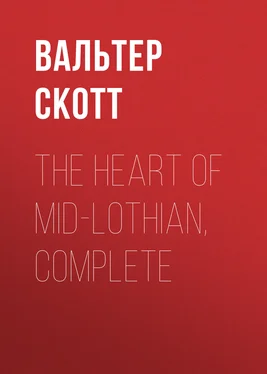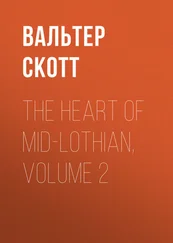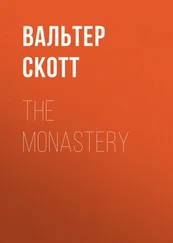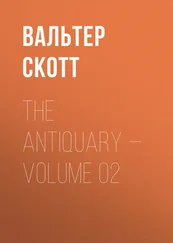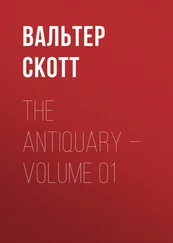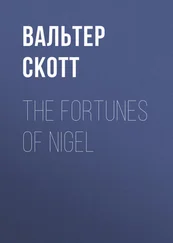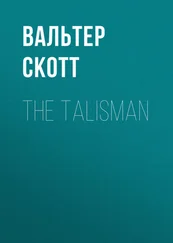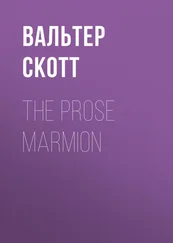Вальтер Скотт - The Heart of Mid-Lothian, Complete
Здесь есть возможность читать онлайн «Вальтер Скотт - The Heart of Mid-Lothian, Complete» — ознакомительный отрывок электронной книги совершенно бесплатно, а после прочтения отрывка купить полную версию. В некоторых случаях можно слушать аудио, скачать через торрент в формате fb2 и присутствует краткое содержание. Жанр: foreign_prose, foreign_antique, на английском языке. Описание произведения, (предисловие) а так же отзывы посетителей доступны на портале библиотеки ЛибКат.
- Название:The Heart of Mid-Lothian, Complete
- Автор:
- Жанр:
- Год:неизвестен
- ISBN:нет данных
- Рейтинг книги:3 / 5. Голосов: 1
-
Избранное:Добавить в избранное
- Отзывы:
-
Ваша оценка:
- 60
- 1
- 2
- 3
- 4
- 5
The Heart of Mid-Lothian, Complete: краткое содержание, описание и аннотация
Предлагаем к чтению аннотацию, описание, краткое содержание или предисловие (зависит от того, что написал сам автор книги «The Heart of Mid-Lothian, Complete»). Если вы не нашли необходимую информацию о книге — напишите в комментариях, мы постараемся отыскать её.
The Heart of Mid-Lothian, Complete — читать онлайн ознакомительный отрывок
Ниже представлен текст книги, разбитый по страницам. Система сохранения места последней прочитанной страницы, позволяет с удобством читать онлайн бесплатно книгу «The Heart of Mid-Lothian, Complete», без необходимости каждый раз заново искать на чём Вы остановились. Поставьте закладку, и сможете в любой момент перейти на страницу, на которой закончили чтение.
Интервал:
Закладка:
“Weel, aweel,” replied Bartoline, as laconically as before.
“And his lordship, the Earl of Blazonbury, Lord Flash and Flame, is like to be clean daft, that the harness for the six Flanders mears, wi’ the crests, coronets, housings, and mountings conform, are no sent hame according to promise gien.”
“Weel, weel, weel—weel, weel, gudewife,” said Saddletree, “if he gangs daft, we’ll hae him cognosced—it’s a’ very weel.”
“It’s weel that ye think sae, Mr. Saddletree,” answered his helpmate, rather nettled at the indifference with which her report was received; “there’s mony ane wad hae thought themselves affronted, if sae mony customers had ca’d and naebody to answer them but women-folk; for a’ the lads were aff, as soon as your back was turned, to see Porteous hanged, that might be counted upon; and sae, you no being at hame—”
“Houts, Mrs. Saddletree,” said Bartoline, with an air of consequence, “dinna deave me wi’ your nonsense; I was under the necessity of being elsewhere— non omnia —as Mr. Crossmyloof said, when he was called by two macers at once— non omnia possumus—pessimus—possimis —I ken our law-latin offends Mr. Butler’s ears, but it means, Naebody, an it were the Lord President himsell, can do twa turns at ance.”
“Very right, Mr. Saddletree,” answered his careful helpmate, with a sarcastic smile; “and nae doubt it’s a decent thing to leave your wife to look after young gentlemen’s saddles and bridles, when ye gang to see a man, that never did ye nae ill, raxing a halter.”
“Woman,” said Saddletree, assuming an elevated tone, to which the meridian had somewhat contributed, “desist,—I say forbear, from intromitting with affairs thou canst not understand. D’ye think I was born to sit here brogging an elshin through bend-leather, when sic men as Duncan Forbes, and that other Arniston chield there, without muckle greater parts, if the close-head speak true, than mysell maun be presidents and king’s advocates, nae doubt, and wha but they? Whereas, were favour equally distribute, as in the days of the wight Wallace—”
“I ken naething we wad hae gotten by the wight Wallace,” said Mrs. Saddletree, “unless, as I hae heard the auld folk tell, they fought in thae days wi’ bend-leather guns, and then it’s a chance but what, if he had bought them, he might have forgot to pay for them. And as for the greatness of your parts, Bartley, the folk in the close-head 13 13 [ Close-head, the entrance of a blind alley.]
maun ken mair about them than I do, if they make sic a report of them.”
“I tell ye, woman,” said Saddletree, in high dudgeon, “that ye ken naething about these matters. In Sir William Wallace’s days there was nae man pinned down to sic a slavish wark as a saddler’s, for they got ony leather graith that they had use for ready-made out of Holland.”
“Well,” said Butler, who was, like many of his profession, something of a humorist and dry joker, “if that be the case, Mr. Saddletree, I think we have changed for the better; since we make our own harness, and only import our lawyers from Holland.”
“It’s ower true, Mr. Butler,” answered Bartoline, with a sigh; “if I had had the luck—or rather, if my father had had the sense to send me to Leyden and Utrecht to learn the Substitutes and Pandex—”
“You mean the Institutes—Justinian’s Institutes, Mr. Saddletree?” said Butler.
“Institutes and substitutes are synonymous words, Mr. Butler, and used indifferently as such in deeds of tailzie, as you may see in Balfour’s Practiques, or Dallas of St. Martin’s Styles. I understand these things pretty weel, I thank God but I own I should have studied in Holland.”
“To comfort you, you might not have been farther forward than you are now, Mr. Saddletree,” replied Mr. Butler; “for our Scottish advocates are an aristocratic race. Their brass is of the right Corinthian quality, and Non cuivis contigit adire Corinthum —Aha, Mr. Saddletree?”
“And aha, Mr. Butler,” rejoined Bartoline, upon whom, as may be well supposed, the jest was lost, and all but the sound of the words, “ye said a gliff syne it was quivis, and now I heard ye say cuivis with my ain ears, as plain as ever I heard a word at the fore-bar.”
“Give me your patience, Mr. Saddletree, and I’ll explain the discrepancy in three words,” said Butler, as pedantic in his own department, though with infinitely more judgment and learning, as Bartoline was in his self-assumed profession of the law—“Give me your patience for a moment—You’ll grant that the nominative case is that by which a person or thing is nominated or designed, and which may be called the primary case, all others being formed from it by alterations of the termination in the learned languages, and by prepositions in our modern Babylonian jargons—You’ll grant me that, I suppose, Mr. Saddletree?”
“I dinna ken whether I will or no— ad avisandum, ye ken—naebody should be in a hurry to make admissions, either in point of law, or in point of fact,” said Saddletree, looking, or endeavouring to look, as if he understood what was said.
“And the dative case,” continued Butler
“I ken what a tutor dative is,” said Saddletree, “readily enough.”
“The dative case,” resumed the grammarian, “is that in which anything is given or assigned as properly belonging to a person or thing—You cannot deny that, I am sure.”
“I am sure I’ll no grant it, though,” said Saddletree.
“Then, what the deevil d’ye take the nominative and the dative cases to be?” said Butler, hastily, and surprised at once out of his decency of expression and accuracy of pronunciation.
“I’ll tell you that at leisure, Mr. Butler,” said Saddletree, with a very knowing look; “I’ll take a day to see and answer every article of your condescendence, and then I’ll hold you to confess or deny as accords.”
“Come, come, Mr. Saddletree,” said his wife, “we’ll hae nae confessions and condescendences here; let them deal in thae sort o’ wares that are paid for them—they suit the like o’ us as all as a demipique saddle would suit a draught ox.”
“Aha!” said Mr. Butler, “ Optat ephippia bos piger, nothing new under the sun—But it was a fair hit of Mrs. Saddletree, however.”
“And it wad far better become ye, Mr. Saddletree,” continued his helpmate, “since ye say ye hae skeel o’ the law, to try if ye can do onything for Effie Deans, puir thing, that’s lying up in the tolbooth yonder, cauld, and hungry, and comfortless—A servant lass of ours, Mr. Butler, and as innocent a lass, to my thinking, and as usefu’ in the shop—When Mr. Saddletree gangs out,—and ye’re aware he’s seldom at hame when there’s ony o’ the plea-houses open,—poor Effie used to help me to tumble the bundles o’ barkened leather up and down, and range out the gudes, and suit a’ body’s humours—And troth, she could aye please the customers wi’ her answers, for she was aye civil, and a bonnier lass wasna in Auld Reekie. And when folk were hasty and unreasonable, she could serve them better than me, that am no sae young as I hae been, Mr. Butler, and a wee bit short in the temper into the bargain. For when there’s ower mony folks crying on me at anes, and nane but ae tongue to answer them, folk maun speak hastily, or they’ll ne’er get through their wark—Sae I miss Effie daily.”
“ De die in diem, ” added Saddletree.
“I think,” said Butler, after a good deal of hesitation, “I have seen the girl in the shop—a modest-looking, fair-haired girl?”
“Ay, ay, that’s just puir Effie,” said her mistress. “How she was abandoned to hersell, or whether she was sackless o’ the sinful deed, God in Heaven knows; but if she’s been guilty, she’s been sair tempted, and I wad amaist take my Bible-aith she hasna been hersell at the time.”
Читать дальшеИнтервал:
Закладка:
Похожие книги на «The Heart of Mid-Lothian, Complete»
Представляем Вашему вниманию похожие книги на «The Heart of Mid-Lothian, Complete» списком для выбора. Мы отобрали схожую по названию и смыслу литературу в надежде предоставить читателям больше вариантов отыскать новые, интересные, ещё непрочитанные произведения.
Обсуждение, отзывы о книге «The Heart of Mid-Lothian, Complete» и просто собственные мнения читателей. Оставьте ваши комментарии, напишите, что Вы думаете о произведении, его смысле или главных героях. Укажите что конкретно понравилось, а что нет, и почему Вы так считаете.
